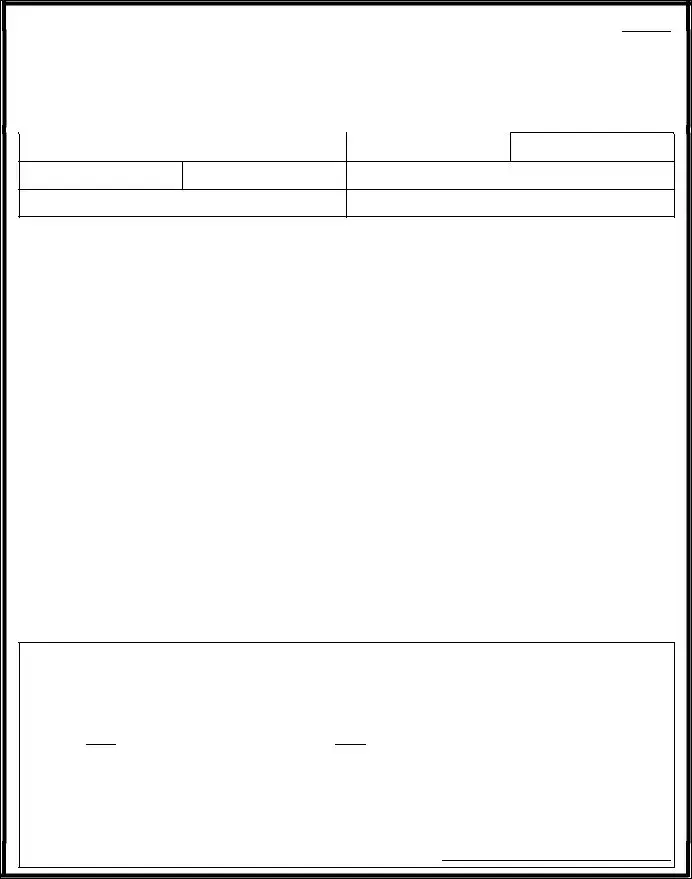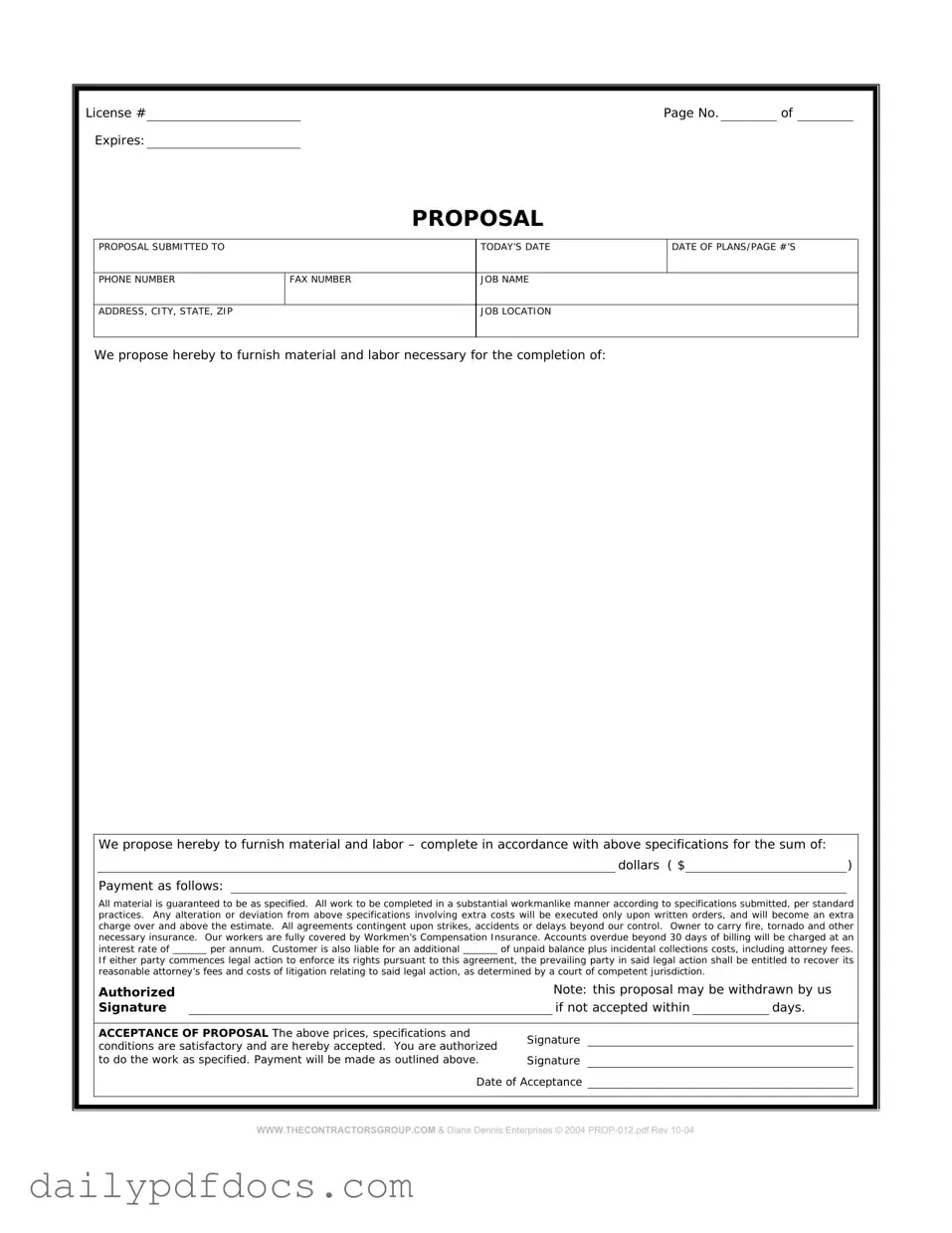Fill Your Construction proposal form Form
When embarking on a construction project, clarity and organization are paramount. The Construction Proposal Form serves as a crucial tool for contractors and clients alike, ensuring that all parties have a clear understanding of the project's scope, costs, and timelines. This form typically includes key details such as the project description, estimated budget, and a breakdown of materials and labor costs. Additionally, it outlines the proposed schedule, allowing for a realistic timeline that can help manage expectations. Important terms and conditions are also included, safeguarding both the contractor and the client throughout the project. By utilizing this form, stakeholders can minimize misunderstandings and set a solid foundation for a successful construction endeavor.
Find Other Documents
Ubc Dli Number - Common-law partnerships must be documented if they exist during the application process.
Odometer Disclosure Statement Ca - It can help potential buyers verify claims made by sellers regarding mileage.
In Texas, having a proper understanding of the Texas Mobile Home Bill of Sale is vital for anyone looking to buy or sell a mobile home, as it not only outlines the basic details of the transaction but also ensures legal protection for both parties involved. For those interested, a helpful resource is available at mobilehomebillofsale.com/blank-texas-mobile-home-bill-of-sale, which provides a blank form that can assist in facilitating this important transfer of ownership.
Youth Basketball Evaluation Form - Off-ball defense is vital in understanding a player's awareness and positioning.
Common Questions
What is a construction proposal form?
A construction proposal form is a document that outlines the details of a construction project. It typically includes information about the scope of work, materials needed, estimated costs, and timelines. This form serves as a formal offer from a contractor to a client, detailing how the contractor plans to complete the project.
Why is a construction proposal form important?
This form is essential because it sets clear expectations for both parties. It helps prevent misunderstandings by providing a detailed description of the work to be done, the costs involved, and the schedule. Having this information documented can protect both the contractor and the client if disputes arise later.
What information should be included in a construction proposal form?
A comprehensive construction proposal form should include the project description, a breakdown of costs, timelines for completion, payment terms, and any necessary permits or licenses. It may also outline the responsibilities of both the contractor and the client, ensuring everyone is on the same page.
Who typically fills out the construction proposal form?
Generally, it is the contractor who fills out the construction proposal form. They assess the project requirements and provide a detailed proposal based on their expertise. However, clients can also provide input to ensure their needs and expectations are met.
How does a client respond to a construction proposal form?
Clients can respond to a construction proposal form by reviewing the details and either accepting, rejecting, or requesting modifications to the proposal. If the client agrees with the terms, they may sign the form to indicate their acceptance and move forward with the project.
Can a construction proposal form be modified after submission?
Yes, a construction proposal form can be modified after submission, but both parties must agree to any changes. It’s important to document any modifications in writing to ensure clarity and avoid future disputes.
Is a construction proposal form legally binding?
While a construction proposal form can serve as a binding agreement if signed by both parties, it often functions more as an offer. For it to become a legally binding contract, both parties typically need to sign and agree to the terms outlined in the proposal.
How can clients ensure they receive accurate proposals?
Clients can help ensure they receive accurate proposals by providing detailed project specifications and requirements upfront. Clear communication about expectations, budget constraints, and timelines can lead to more precise estimates from contractors.
What should clients do if they have questions about a proposal?
If clients have questions about a proposal, they should reach out to the contractor for clarification. Open communication is key; discussing any uncertainties can help both parties feel more confident moving forward.
Are there different types of construction proposal forms?
Yes, there are various types of construction proposal forms, including fixed-price proposals, cost-plus proposals, and time and materials proposals. Each type serves different project needs and financial arrangements, so it’s important for clients to understand which type is being used and how it affects their project.
Preview - Construction proposal form Form

License # |
|
Page No. |
|
of |
Expires: |
|
|
|
|
PROPOSAL
PROPOSAL SUBMITTED TO |
TODAY’S DATE |
DATE OF PLANS/PAGE #’S
PHONE NUMBER
FAX NUMBER
JOB NAME
ADDRESS, CITY, STATE, ZIP
JOB LOCATION
We propose hereby to furnish material and labor necessary for the completion of:
We propose hereby to furnish material and labor – complete in accordance with above specifications for the sum of: |
|
|||
|
|
dollars ( $ |
|
) |
Payment as follows: |
|
|
||
All material is guaranteed to be as specified. All work to be completed in a substantial workmanlike manner according to specifications submitted, per standard practices. Any alteration or deviation from above specifications involving extra costs will be executed only upon written orders, and will become an extra charge over and above the estimate. All agreements contingent upon strikes, accidents or delays beyond our control. Owner to carry fire, tornado and other necessary insurance. Our workers are fully covered by Workmen’s Compensation Insurance. Accounts overdue beyond 30 days of billing will be charged at an
interest rate of per annum. Customer is also liable for an additional of unpaid balance plus incidental collections costs, including attorney fees. If either party commences legal action to enforce its rights pursuant to this agreement, the prevailing party in said legal action shall be entitled to recover its reasonable attorney’s fees and costs of litigation relating to said legal action, as determined by a court of competent jurisdiction.
Authorized |
|
Note: this proposal may be withdrawn by us |
|||||
Signature |
|
|
if not accepted within |
|
days. |
||
|
|
|
|
|
|
|
|
ACCEPTANCE OF PROPOSAL The above prices, specifications and |
Signature |
|
|
|
|||
conditions are satisfactory and are hereby accepted. You are authorized |
|
|
|
||||
|
|
|
|
|
|
||
to do the work as specified. Payment will be made as outlined above. |
Signature |
|
|
|
|
||
Date of Acceptance
WWW.THECONTRACTORSGROUP.COM & Diane Dennis Enterprises © 2004
Similar forms
The Construction Proposal Form serves a critical role in the construction industry. It is essential to understand how it compares to other important documents. Here are five documents that share similarities with the Construction Proposal Form:
- Bid Proposal: Like the Construction Proposal Form, a bid proposal outlines the costs and scope of work for a project. Both documents aim to secure a contract by detailing what the contractor will deliver and at what price.
- Contractor Agreement: This document formalizes the relationship between the contractor and the client. Similar to the Construction Proposal Form, it specifies terms, conditions, and expectations for the project, ensuring both parties understand their obligations.
- Scope of Work Document: A scope of work document defines the specific tasks to be completed in a project. It aligns closely with the Construction Proposal Form, as both documents clarify project deliverables and help prevent misunderstandings.
- Change Order: A change order modifies the original agreement by documenting changes in the project scope or costs. This document is similar to the Construction Proposal Form in that it requires clear communication and agreement on adjustments to the initial proposal.
Property Transfer Deed Form: For those engaged in real estate transactions, the beneficial Arizona deed form resources facilitate the accurate transfer of property ownership and document the transaction properly.
- Request for Proposal (RFP): An RFP solicits proposals from contractors for a specific project. This document is akin to the Construction Proposal Form, as both serve to outline project requirements and invite detailed responses from potential contractors.
Misconceptions
Misconceptions about the Construction proposal form can lead to confusion and potential issues in the bidding process. Below are six common misconceptions, along with clarifications to help ensure a better understanding.
- All proposals must be identical. Many believe that every construction proposal must follow the same format and include the same information. In reality, proposals can vary based on the project requirements and the contractor’s preferences.
- A proposal guarantees the project. Some people think that submitting a proposal guarantees that the contractor will be awarded the project. This is not true; a proposal is merely an offer, and the final decision rests with the project owner.
- Only large companies can submit proposals. There is a misconception that only large construction firms can submit proposals for projects. In fact, small and medium-sized businesses can and do successfully submit proposals and win contracts.
- Proposal forms are optional. Some individuals believe that using a proposal form is optional. However, many project owners require a standardized proposal form to ensure consistency and completeness in the submissions they receive.
- All costs must be included upfront. It is often thought that all potential costs must be included in the initial proposal. While it is important to provide a comprehensive estimate, some costs may be adjusted or clarified during negotiations.
- Once submitted, proposals cannot be changed. Many assume that proposals are set in stone once submitted. However, it is usually possible to amend a proposal before the submission deadline if new information arises or corrections are needed.
File Attributes
| Fact Name | Description |
|---|---|
| Purpose | The construction proposal form is used to outline the details of a construction project, including scope, costs, and timelines. |
| State-Specific Forms | Different states may have their own specific forms that comply with local regulations and laws. |
| Governing Laws | In states like California, the construction proposal form must adhere to the California Business and Professions Code. |
| Importance of Accuracy | Accurate information on the form is crucial, as it can affect contract negotiations and project execution. |
